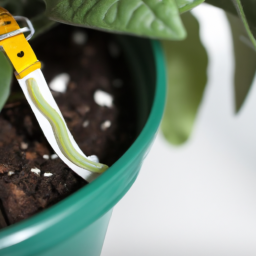
Are pesky insects and unwanted critters wreaking havoc on your garden? If you’re looking for a way to tackle these pests without resorting to harmful chemicals, then you’ve come to the right place. In this blog post, we’ll explore the wonderful world of natural pest control and discover how you can keep your garden chemical-free. With a focus on environmentally friendly solutions, we’ll delve into the benefits of using natural methods to protect your plants and maintain a healthy ecosystem. So, whether you’re a seasoned gardener or just starting out, let’s dive in and explore the fascinating world of natural pest control.
Benefits of Natural Pest Control Methods for Your Garden
When it comes to maintaining a healthy and thriving garden, pest control is a crucial aspect. However, using chemical pesticides can have detrimental effects on the environment, as well as the health of your plants, pets, and even yourself. That’s why natural pest control methods are gaining popularity among gardeners. In this article, we will explore the numerous benefits of using natural pest control methods for your garden.
1. Environmentally Friendly
One of the primary advantages of natural pest control methods is their minimal impact on the environment. Chemical pesticides often contain harmful toxins that can contaminate the soil, water sources, and air. These toxins not only harm beneficial insects and wildlife but also pose a risk to human health. On the other hand, natural pest control methods utilize organic and biodegradable substances that are safe for the environment. By opting for natural pest control, you contribute to the preservation of biodiversity and a healthier ecosystem.
Natural pest control methods also promote sustainability by reducing the use of non-renewable resources. Chemical pesticides are typically derived from fossil fuels, whereas natural alternatives rely on renewable resources such as plant extracts, essential oils, and beneficial insects. By embracing natural pest control, you actively participate in creating a more sustainable future.
Furthermore, natural pest control methods do not contribute to air and water pollution. Chemical pesticides can easily find their way into nearby water bodies, contaminating aquatic life and disrupting the delicate balance of ecosystems. By choosing natural alternatives, you help protect water sources and maintain a cleaner environment for all living organisms.
2. Healthier Plants
Chemical pesticides may effectively eliminate pests, but they also harm the plants themselves. These toxic substances can weaken the plant’s immune system, making them more susceptible to diseases and other pests. Additionally, chemical residues can accumulate in the plant tissues, affecting their nutritional value and potentially posing health risks to those who consume them.
Natural pest control methods, on the other hand, work in harmony with nature and promote the overall health of your plants. For instance, introducing beneficial insects like ladybugs or lacewings can help control aphids and other harmful pests without causing any harm to the plants. Similarly, using organic sprays made from ingredients like neem oil or garlic can effectively repel pests while nourishing the plants.
By using natural pest control methods, you ensure that your garden remains a thriving and vibrant space, free from the harmful effects of chemical pesticides.
3. Safe for People and Pets
Chemical pesticides pose a significant risk to human health. Exposure to these toxins can lead to various health issues, including skin irritations, respiratory problems, and even more severe conditions like cancer. Children and pets are particularly vulnerable to these harmful substances, as they often come into direct contact with treated areas.
Natural pest control methods provide a safer alternative for both people and pets. Since they are derived from natural sources, they are generally non-toxic and pose minimal risks to human health. This means you can freely enjoy your garden without worrying about harmful chemical residues or potential health hazards.
Moreover, natural pest control methods are often more targeted and specific in their approach. This means they only affect the intended pests, leaving beneficial insects unharmed. By preserving the natural balance of your garden ecosystem, you create a harmonious environment where both pests and beneficial organisms can coexist.
In conclusion, natural pest control methods offer numerous benefits for your garden. They are environmentally friendly, promote healthier plants, and ensure the safety of both people and pets. By adopting natural pest control practices, you contribute to a more sustainable and thriving garden ecosystem. So, why not give natural pest control a try and witness the positive impact it can have on your garden?

Effective Natural Pest Control Techniques for a Chemical-Free Garden
Gardening is a wonderful way to connect with nature and enjoy the beauty of plants. However, dealing with pests can be a real challenge. Many gardeners resort to chemical pesticides, but these can be harmful to the environment, beneficial insects, and even our own health. Fortunately, there are effective natural pest control techniques that can help you maintain a chemical-free garden. In this article, we will explore some of these techniques and provide you with a step-by-step guide to implementing them.
Identify and Monitor Pest Problems
The first step in natural pest control is to identify and monitor the pest problems in your garden. Take the time to observe your plants closely and look for any signs of damage or infestation. Look for chewed leaves, wilting plants, or unusual discoloration. You can also use sticky traps or hand-pick pests to get a better idea of the types of pests you are dealing with.
Once you have identified the pests, research their behavior, lifecycle, and preferred habitats. This information will help you develop effective control strategies. Keep a journal or use a gardening app to record your observations and track the progress of pest populations over time.
Remember, not all insects are pests. Some insects are beneficial and can help control pest populations. Learn to distinguish between harmful pests and beneficial insects, such as ladybugs or lacewings, which feed on garden pests.
Encourage Natural Predators
One of the most effective natural pest control techniques is to encourage natural predators in your garden. Predatory insects, birds, and even small mammals can help keep pest populations in check. Create a welcoming environment for these beneficial creatures by providing them with food, water, and shelter.
Plant a diverse range of flowers, herbs, and shrubs to attract beneficial insects. For example, marigolds, daisies, and lavender are known to attract pollinators and predatory insects. Avoid using chemical pesticides, as they can harm beneficial insects and disrupt the natural balance of your garden ecosystem.
Consider installing bird feeders and birdhouses to attract birds that feed on garden pests. Bats and small mammals like hedgehogs can also help control pests, so provide them with suitable habitats, such as bat boxes or hedgehog houses.
Implement Physical Barriers and Traps
Physical barriers and traps can be effective in preventing pests from reaching your plants or capturing them. Install fences, netting, or row covers to protect your garden from larger pests like rabbits or deer. Use copper tape around pots or raised beds to deter slugs and snails.
You can also make homemade traps to catch specific pests. For example, beer traps can be used to attract and drown slugs. Yellow sticky traps can help control flying pests like aphids or whiteflies. Regularly check and clean these traps to ensure their effectiveness.
Another physical barrier technique is companion planting, where certain plants are grown together to repel pests or attract beneficial insects. For instance, planting marigolds or garlic around your vegetables can help deter pests like aphids or nematodes.
By implementing these natural pest control techniques and being patient and persistent, you can maintain a chemical-free garden and enjoy healthy, thriving plants. Remember to regularly assess the effectiveness of your strategies and make adjustments as needed. Happy gardening!

Essential Plants and Herbs for Natural Pest Control in Your Garden
When it comes to maintaining a chemical-free garden, incorporating natural pest control methods is essential. By using plants and herbs that naturally repel pests, you can create a healthy and thriving garden without relying on harmful chemicals. In this guide, we will explore three essential plants and herbs that can help you keep your garden pest-free.
1. Marigolds
Marigolds are not only beautiful flowers that add a pop of color to your garden, but they also act as a natural pest repellent. Their strong scent deters a wide range of pests, including aphids, nematodes, and even rabbits. Planting marigolds around your garden can help protect your other plants from these common pests.
In addition to their pest-repellent properties, marigolds also attract beneficial insects such as ladybugs and lacewings. These insects are natural predators of many garden pests, and by attracting them to your garden, you create a balanced ecosystem that can help control pest populations.
When planting marigolds, make sure to choose varieties with strong scents, such as French marigolds or Mexican marigolds. You can interplant them with your other vegetables or flowers or create a border around your garden to maximize their pest-repellent effect.
2. Basil
Basil is not only a versatile herb for cooking, but it also has natural pest-repellent properties. Its strong aroma repels mosquitoes, flies, and even some types of beetles. By planting basil in your garden, you can reduce the presence of these annoying pests and enjoy your outdoor space without the need for chemical sprays.
One of the great things about basil is that it is easy to grow and requires minimal care. You can plant it in pots or directly in the ground, as long as it receives plenty of sunlight. To maximize its pest-repellent effect, consider planting basil near doors, windows, or outdoor seating areas to keep mosquitoes and flies at bay.
Aside from its pest-repellent properties, basil also attracts bees, which are essential pollinators for many plants in your garden. By planting basil, you not only control pests naturally but also support a healthy and thriving garden ecosystem.
3. Chrysanthemums
Chrysanthemums, commonly known as mums, are not only beautiful fall flowers but also effective natural pest control agents. They contain a compound called pyrethrum, which is commonly used in organic insecticides. When planted in your garden, chrysanthemums repel a wide range of pests, including ants, roaches, ticks, and silverfish.
To utilize the pest-repellent properties of chrysanthemums, you can either plant them directly in your garden or use them as companion plants. Companion planting involves placing certain plants together to enhance their growth or repel pests. By planting chrysanthemums near vegetables or other susceptible plants, you can create a natural barrier against pests.
It’s important to note that while chrysanthemums are effective in repelling pests, they are toxic to some beneficial insects as well. Therefore, it’s crucial to use them strategically and not in areas where you want to attract pollinators like bees and butterflies.
By incorporating these essential plants and herbs into your garden, you can effectively control pests without resorting to chemical pesticides. Remember to choose varieties with strong scents or specific pest-repellent properties to maximize their effectiveness. Creating a diverse and balanced ecosystem in your garden will not only keep pests at bay but also promote the overall health and vitality of your plants.
Key Takeaways of this article
Are pesky pests ruining your beautiful garden? Don’t worry, there’s no need to resort to harmful chemicals to keep them at bay. Natural pest control methods are not only effective, but they also ensure the health and safety of your plants, family, and the environment. In this blog post, we’ll explore some simple yet powerful techniques to keep your garden chemical-free and thriving.
One of the easiest ways to control pests naturally is by encouraging beneficial insects to visit your garden. Ladybugs, lacewings, and praying mantises are just a few examples of nature’s pest control squad. These helpful insects feast on harmful bugs like aphids and caterpillars, keeping their populations in check. To attract them, plant flowers like marigolds and lavender, which have a strong fragrance that repels pests while attracting beneficial insects. Additionally, creating a diverse garden with a variety of plants provides a habitat for these good bugs to thrive.
Check Out These FAQs:
Q1: What is natural pest control and why should I use it in my garden?
A1: Natural pest control refers to the use of organic and environmentally friendly methods to manage pests in your garden, without relying on chemical pesticides. It involves utilizing natural predators, companion planting, physical barriers, and organic sprays. By using natural pest control methods, you can protect your garden from harmful pests while minimizing the negative impact on the environment, beneficial insects, and your health.
Q2: How can I attract beneficial insects to my garden for pest control?
A2: To attract beneficial insects, you can incorporate a variety of plants that provide food and habitat for them. Flowers such as marigolds, lavender, and daisies are known to attract beneficial insects like ladybugs and lacewings. Additionally, planting herbs like dill, fennel, and cilantro can attract predatory wasps that help control pests. Providing water sources like shallow dishes or birdbaths can also encourage beneficial insects to visit your garden.
Q3: What are some natural ways to deter common garden pests?
A3: There are several natural methods you can employ to deter common garden pests. For example, planting strong-smelling herbs like mint, rosemary, or basil can help repel pests like aphids, mosquitoes, and flies. Creating physical barriers like netting or row covers can protect your plants from larger pests such as rabbits or birds. Additionally, using organic sprays made from ingredients like neem oil, garlic, or soap can help control pests without harming beneficial insects.
Q4: How does companion planting help with natural pest control?
A4: Companion planting involves strategically planting different crops together to benefit each other. Certain plants can repel pests or attract beneficial insects when planted alongside susceptible plants. For instance, planting marigolds near tomatoes can deter nematodes, while planting nasturtiums near squash can attract aphids away from the main crop. By using companion planting techniques, you can naturally reduce pest populations and promote a healthier garden ecosystem.
Q5: Can natural pest control methods be as effective as chemical pesticides?
A5: While natural pest control methods may require a bit more effort and experimentation, they can be just as effective as chemical pesticides when implemented correctly. By combining multiple strategies like attracting beneficial insects, using physical barriers, and employing organic sprays, you can effectively manage pests in your garden without resorting to harmful chemicals. It may take some time to find the right balance, but the long-term benefits for your garden’s health and the environment are well worth it.

Alex Turner is a sustainable gardening advocate and the founder of an acclaimed indoor gardening blog. With a focus on eco-friendly practices and urban sustainability, Alex combines his background in environmental studies with his love for plants to educate readers on mindful indoor gardening. His work highlights the importance of nurturing both plants and the planet.


